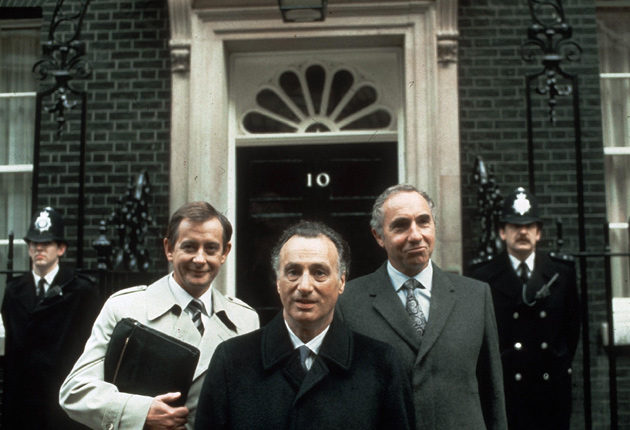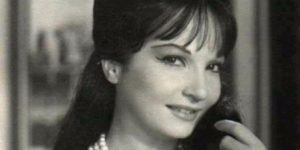 Egypt iconic golden age of entertainment songstress and actress Shadia died aged 86 in Cairo hospital Tuesday 28 November closing a chapter of an unmatched history of culture, art, music, theatre and film that the Nile banks are unlikely to witness in our life time, Adel Darwish writes.
Egypt iconic golden age of entertainment songstress and actress Shadia died aged 86 in Cairo hospital Tuesday 28 November closing a chapter of an unmatched history of culture, art, music, theatre and film that the Nile banks are unlikely to witness in our life time, Adel Darwish writes.
The star, once a pinup girl for Egypt post-war years (until the late 1970s) school boys, acted in over 100 films at a time when Egypt film industry was not only on par with world great cinema product churning centres like India, Soviet Cinema and Hollywood, but also secured Egyptian cultural dominance all over the Arabic speaking nations, making Egyptian language (although rich with Arabic words, it is a distinctively different from Arabic with rich mixed vocabulary from her old pharaonic, Coptic-which is Afro-Asiatic Nilotic-, Greek and later many Mediterranean words from Latin, French, Turkish and Jewish-ladino) the dominant language of popular entertainment, popular culture and performing arts of the area extending between the Atlas Mountains in North West Africa to the straits of Hormuz.
Between 1958 and 1986 Shadia started in too many musical theatrical shows, radio and television plays and sketches to count. She was the star of 114 songs many of them still played today or performed by other singers.
Born Fatima Ahmed Shaker in Cairo in 1981 to a middle class father working a a Rural and farming engineer with the state Department of Agriculture and Irrigation, who encouraged her to apply for drama and film apprenticeship at the age of 14. By the age of 16 she auditioned before one of Egypt film industry pioneers director Ahmed Badrakhan, who gave her a singing role. 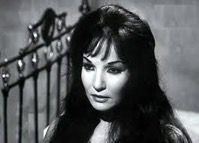
Although most of her roles in the 1950s were in light-comedy and musicals, mostly Egyptianising Hollywood musical comedies, by the early 1960s she worked with progressive film makers taking part in influencing the script with subtle feminist message about equality and changing the perception of women’s role in, and contribution to, society.
In 1966 romantic comedy film Meraty Modeer Aam “ My wife, is the ministry’s Director General” she added lines and interpreted the part of a working wife that not only overtook her husband’s performance at the job, but also added sexual freedom given by the confidence which a woman’s economic independence secures.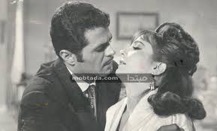
But her 1963 role in Egypt’s novelist and Nobel literature laureate Naguib Mahfouz novel Zouqaq el_Midaqq ( The narrow Ally) was the one that gave her the confidence to make an input into the script and convinced many film makers and producers to take her seriously.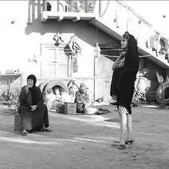
As her songs, and musical theatre became popular and her cinema performance secured box-office takings, she became more confident and choosy by mid 1960s accepting only serious roles with progressive social message like defiance in face of oppression. Her 1969 performance in the film Shaie Min el Khouf ( a touch of fear) where the little sharecroppers stood in defiance against the strong landowners despite having the law of the side of the landowners.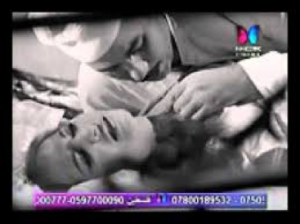
But people still remember her as a great songstress in the popular patriotic-romantic song “ melodies by the Nile – my beloved Egypt”. Although composed in 1969 and Shadia performed it early 1970, placing her alongside Egypt’s great singers-musicians like Sayyed Darweesh the composer of Egypt’s national anthem, Shadia’s 1970 “ melodies by the Nile,” became known as belady ( my homeland) made history when sung by hundreds of thousands in Tahreer-Square 2011 uprising and again by millions in june 2013 overthrowing the fundamentalist Muslim Brotherhood regime. The song, often performed by young female singers, was elevated to a handful of songs that have deep emotional effect likened to that of the Egyptian national anthem.
Although dubbed by her adoring fans for over three decades as Dalouat el-cinema (Cinema’s sweetheart), the younger generations who didn’t experience her flirting roles  between 1947 and 1967 will always remember her excelling in the 1980 theatrical role of the musical black-comedy Riyah and Sakinah, an operetta of a true story of two mass-killer Alexandrian women in the 1920s who, for two years, killed over two dozen women and buried them in the basement of their house, which they leased from the police
between 1947 and 1967 will always remember her excelling in the 1980 theatrical role of the musical black-comedy Riyah and Sakinah, an operetta of a true story of two mass-killer Alexandrian women in the 1920s who, for two years, killed over two dozen women and buried them in the basement of their house, which they leased from the police 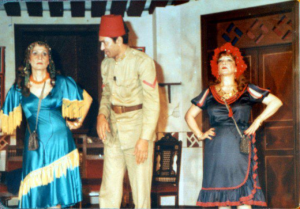 department HQ next-door, under-which their basement of horror extended.
department HQ next-door, under-which their basement of horror extended.
In 1986, Shadia gave a last performance in angelic voice singing Muslim spiritual songs in a mass public performance of El-Leila El-Mohamadeya (A Night for Prophet Muhammad birthday) concert with the religious song Khod Be-Eedy (Take My Hand, O, lord).
Following the spiritual muslim concert, the actress who played bedroom love-scenes and many parts of nightclub hostess bathing in adoring fans’ champagne retired taking up the veil, like many actresses and belly dancers between 1985 and 1990. Egyptian newspapers reported they were given millions of petrodollars by oil sheikhs from the Gulf. None of the entertainment newly veiled ladies demanded retraction from the publications.
———–
Fatima Shaker (known as Shadia), songstress, actress, performer and entertainer. Born Fatima Kamel Cairo 8 February 1931. Died Cairo 28 November 2017
